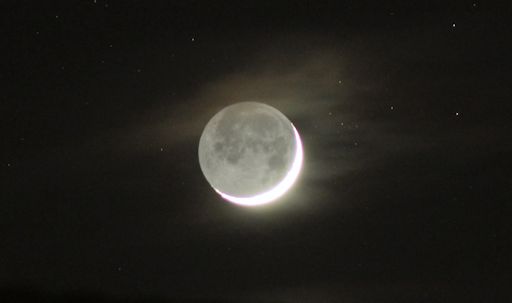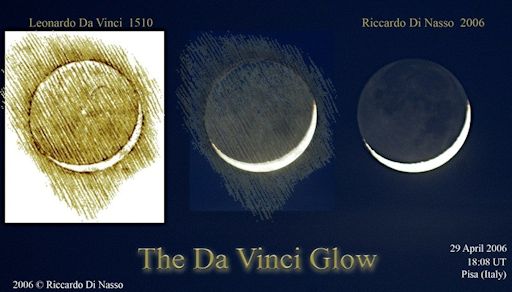Watch out for the Da Vinci glow:
If you go outside tonight to witness the meeting of Venus and the crescent Moon, pay special attention to the Moon. Cradled between the arms of the slender crescent is a display of light and shadow that puzzled sky watchers for thousands of years--until Leonardo Da Vinci figured it out. It's the "Da Vinci glow," also known as Earthshine:
photo Richard Sears
Richard Sears of Merced, California, took the picture last night. "I was getting ready for the Venus-Moon conjunction," he says. "The Earthshine was gorgeous."
For much of human history, people marveled at the faint image of the full Moon inside the arms of the crescent. Where did it come from? No one knew until the 16th century when Leonardo figured it out. He realized that dark lunar terrain was being illuminated by sunlight reflected from Earth.
Visualizing this in the 1500s required a wild kind of imagination. No one had ever been to the Moon and looked "up" at Earth. Most people didn't even know that Earth orbited the sun. Copernicus' sun-centered theory of the solar system wasn't published until 1543, twenty-four years after Leonardo died.

Above: Da Vinci's sketch of Earthshine in 1510 vs. Italian astronomer Riccardo Di Nasso's photo of Earthshine in 2006.
Wild imagination, however, was one thing Leonardo had in abundance. His notebooks are filled with sketches of flying machines, army tanks, scuba gear and other fantastic devices centuries ahead of their time.
In Leonardo's Codex Leicester, circa 1510, there is a page entitled "Of the Moon: No Solid Body is Lighter than Air." He states his belief that the "ghostly glow" is due to sunlight bouncing off Earth's oceans and, in turn, hitting the Moon. 500 years later, we know that Earth's clouds (not oceans) do most of the reflecting; but that is a quibble. Leonardo understood the basics well enough.
Go outside tonight and look to the sky. The Da Vinci Glow is waiting....
Bron: http://spaceweather.com/ | Gewijzigd: 1 februari 2017, 09:26 uur, door Joyce.s

 De " Da Vinci gloed"
De " Da Vinci gloed"




